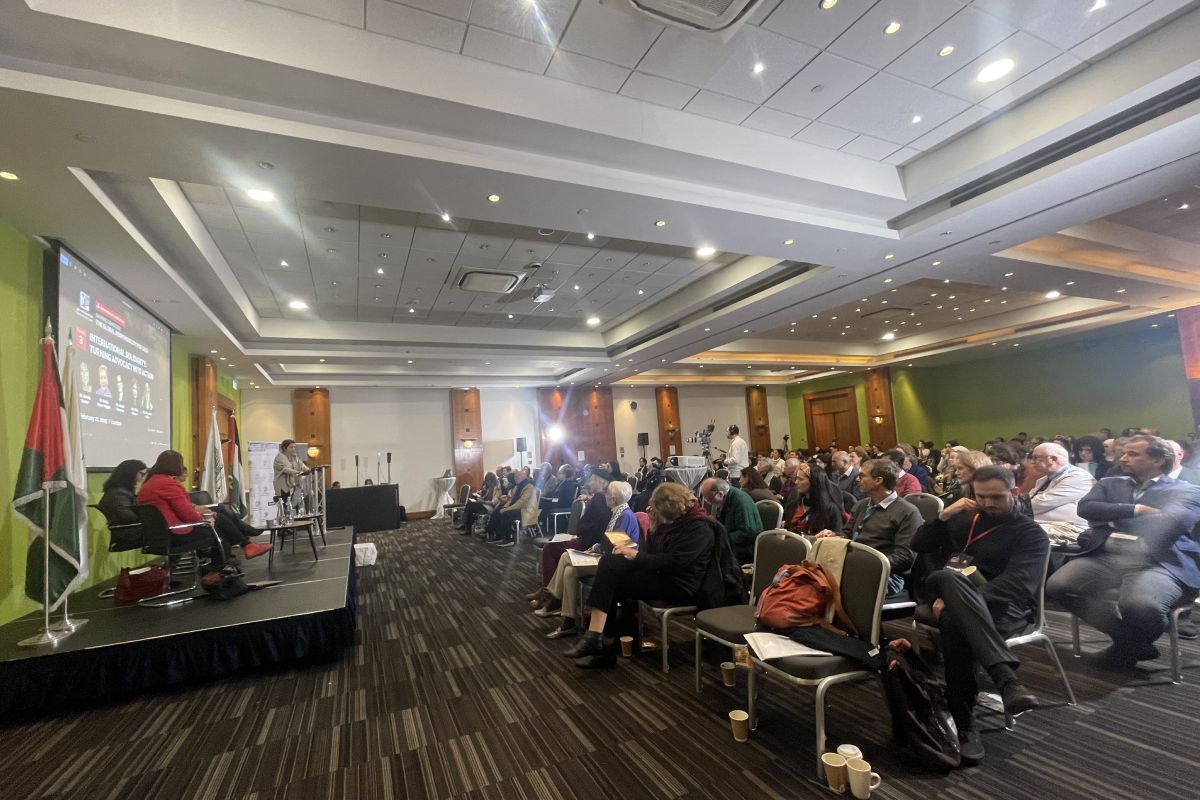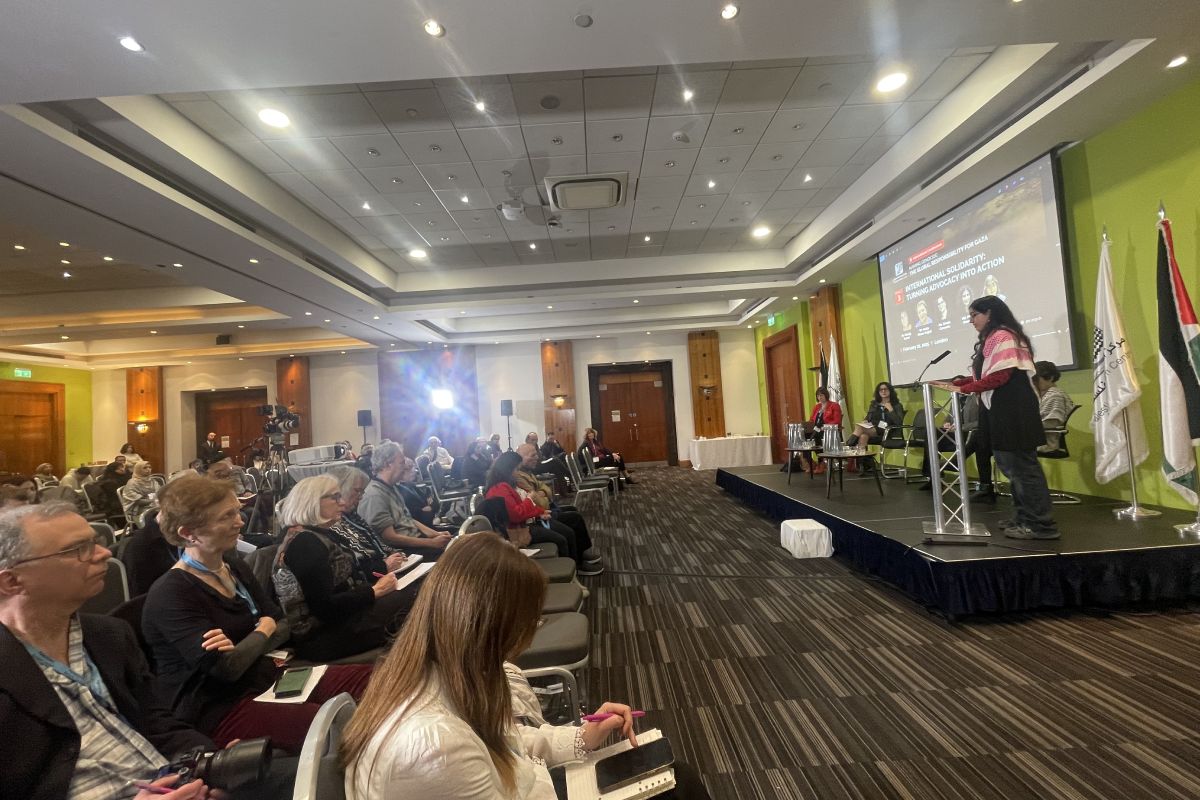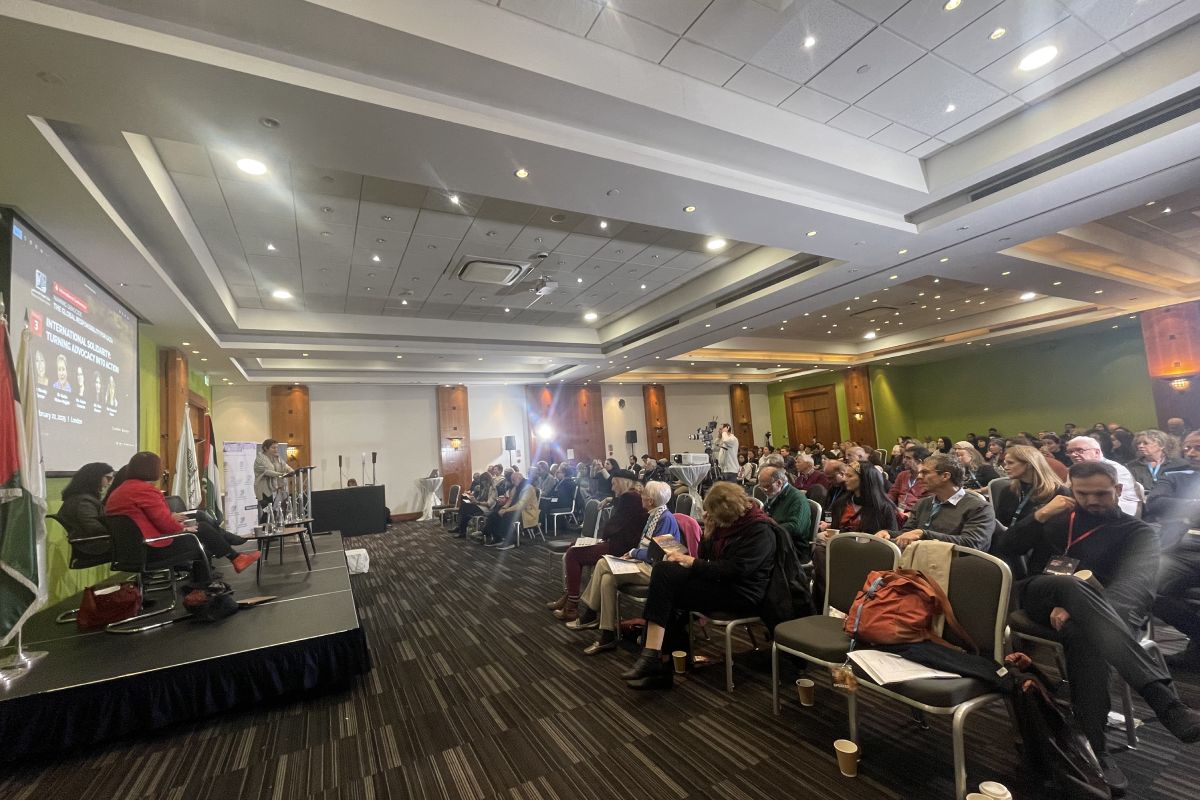Panel 3: International Solidarity – Turning Advocacy into Action

At the Naming Genocide: The Global Responsibility for Gaza conference, the third and final panel, titled "International Solidarity: Turning Advocacy into Action," explored how global activism can translate into tangible change for Palestinian rights. Chaired by Dr. Mandy Turner, a senior researcher with Security in Context, the session featured leading experts and activists discussing the mechanisms of legal accountability, media advocacy, grassroots mobilisation, and state-level interventions.
With powerful insights from Dr. Nadia Naser-Najjab, Ms. Grazia Careccia, Att. Mira Naseer, and Ms. Nuvpreet Kalra, the session underscored that solidarity is not charity—rather, it is an active commitment to dismantling Israel’s system of apartheid and genocide through legal, economic, and political action.
Mandy Turner: The Necessity of Global Solidarity
Opening the session, Dr. Mandy Turner, Senior researcher with Security in Context, highlighted the historical role of activism in ending colonialism and state repression. She emphasised that every major human rights victory, from South African apartheid to indigenous resistance movements worldwide, was only achieved through persistent international solidarity.
Dr. Turner called for multi-level activism, including diplomatic efforts such as South Africa’s case at the International Court of Justice (ICJ), legal work from international human rights organisations, and mass mobilisation at the grassroots level.
"Palestinians on the inside need our solidarity on the outside," she stressed. "Not charity, not saviorism—solidarity. And we must push our governments to end their complicity."
She also warned of the escalating repression against Palestinian advocacy, pointing to state-led crackdowns, surveillance, and corporate censorship aimed at silencing solidarity movements. Despite these challenges, she reaffirmed that the Palestine solidarity movement is growing every day and has been identified by Israel as a "fundamental existential threat."
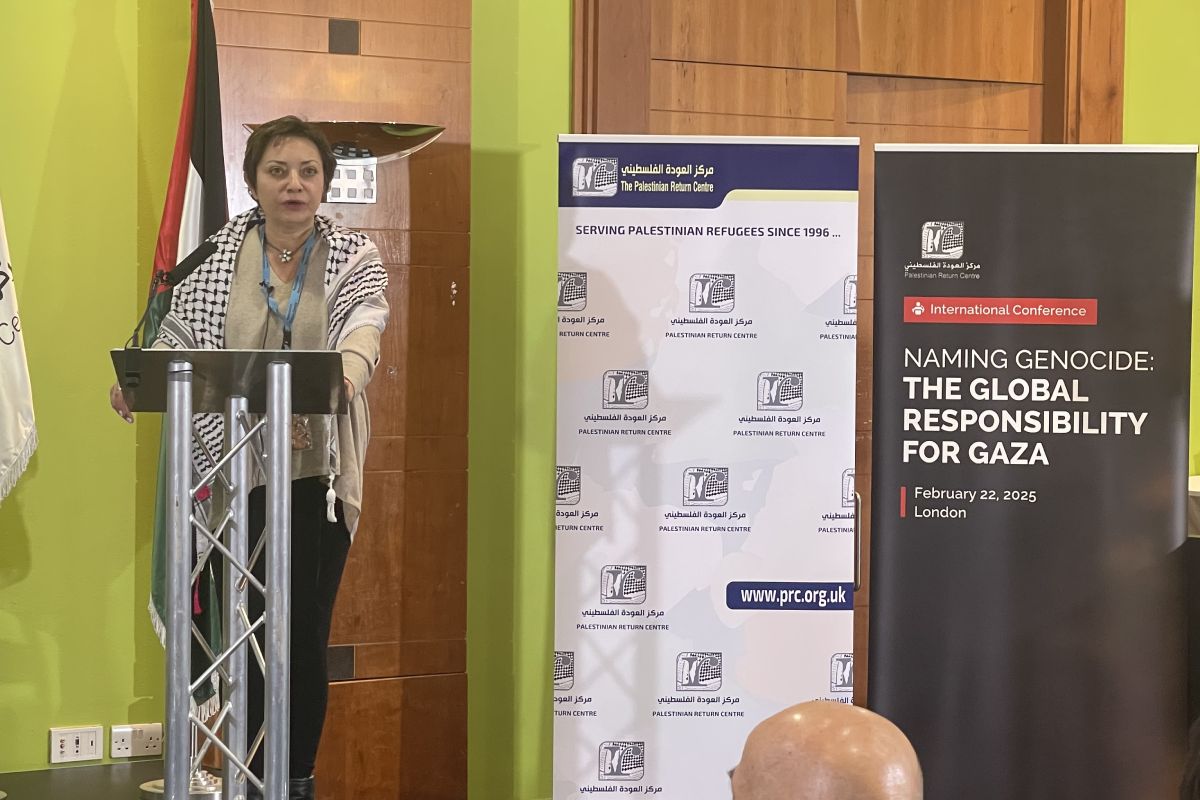
Dr. Nadia Naser-Najjab: Lessons from Historic Solidarity Movements
Dr. Nadia Naser-Najjab, a senior lecturer in Palestine Studies and co-director of the European Centre for Palestine Studies (ECPS) University of Exeter, highlighted the long history of international engagement in the Palestinian struggle, acknowledging both its damaging and supportive roles. From the Balfour Declaration to recent U.S. policies, global interventions have often aligned with Zionist objectives, perpetuating dispossession and occupation. However, history has also seen powerful expressions of solidarity, particularly during the 1970s, when the Palestinian Liberation Organisation (PLO) gained support from anti-colonial and anti-imperial movements. The First Intifada in 1987 further cemented international awareness, with media coverage exposing Israel’s brutal suppression of peaceful Palestinian protests.
She critiqued the Oslo Accords and the People-to-People programs, which sought to normalise Israeli occupation under the guise of coexistence. These initiatives, detached from Palestinian realities, failed to acknowledge the fragmentation of Palestinian land and the expansion of illegal settlements. Palestinian civil society ultimately rejected such programs, insisting that solidarity must be action-based and aimed at dismantling oppression rather than reinforcing illusions of reconciliation.
International solidarity movements, particularly the International Solidarity Movement, have played a crucial role in resisting Israeli aggression, documenting abuses, and accompanying Palestinians facing settler violence. Social media has further amplified Palestinian voices, exposed war crimes and countering Western media biases. Despite Israel’s relentless attempts to silence activists, global support continues to grow, reinforcing calls for boycotts, divestments, and sanctions.
She concluded by emphasising that Palestinians remain steadfast in their struggle, grounded in what Mahmoud Darwish called an “incurable disease” of hope. International solidarity, when rooted in action and justice, remains an essential force in confronting Israeli apartheid and advancing Palestinian liberation.
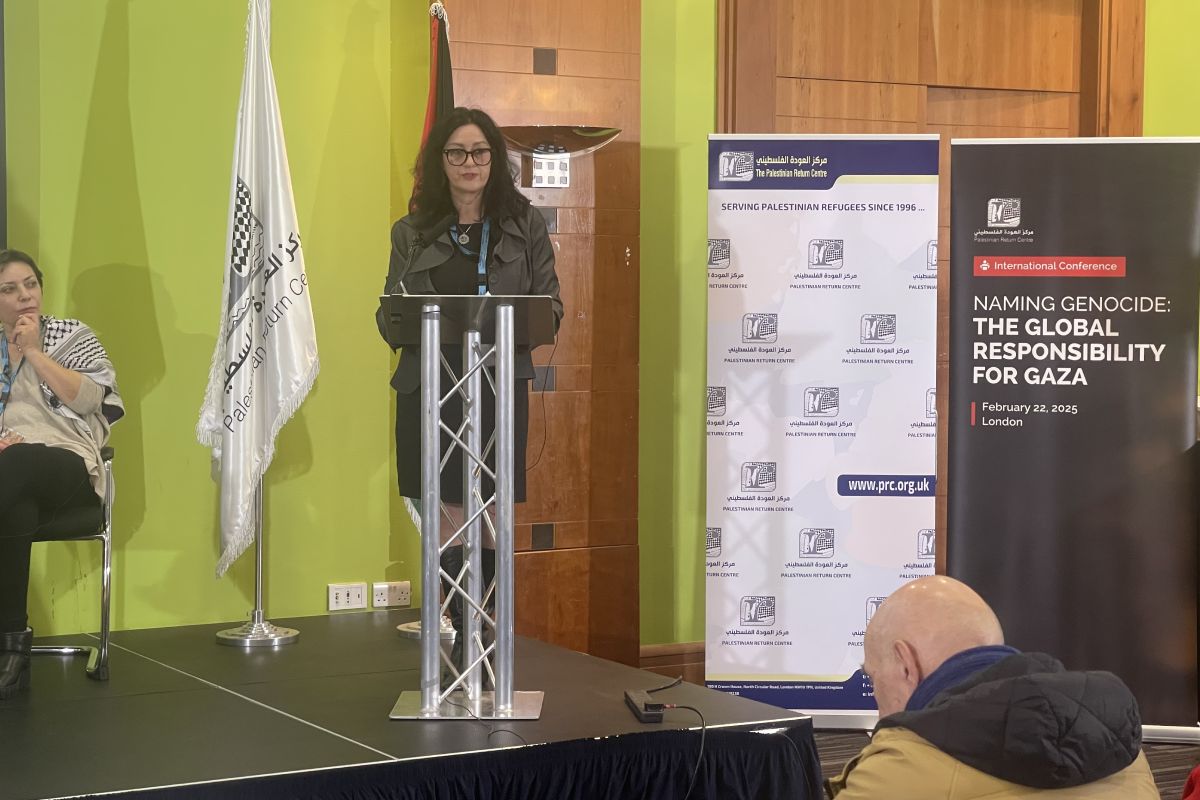
Grazia Careccia: Amnesty International’s Genocide Report and Legal Implications
Ms. Grazia Careccia, Deputy Regional Director at Amnesty International, emphasised the urgency of addressing the ongoing genocide in Gaza, thanking the organisers for providing a space to unpack Amnesty International’s extensive report. This 300-page investigation, conducted with on-the-ground researchers, presents undeniable evidence that Israel has committed and continues to commit genocide.
Amnesty International’s findings confirm that Israel has engaged in three prohibited acts under Article II of the Genocide Convention: mass killings, infliction of serious bodily and mental harm, and the deliberate creation of conditions that make Palestinian life unsustainable. Through over 212 interviews, satellite imagery analysis, and forensic military assessments, the report documents the forced displacement of 1.9 million people, the destruction of healthcare facilities, and the use of starvation as a weapon.
One of the key elements of Amnesty’s report is the assessment of genocidal intent. Over 100 official Israeli statements were analysed, with 22 directly inciting genocide. These statements were not isolated rhetoric but were translated into policy, as evidenced by the Israeli military’s widespread destruction of civilian infrastructure, hospitals, and universities. Israeli soldiers openly celebrated acts of destruction, reinforcing the systemic dehumanisation of Palestinians. The total lack of accountability within Israeli institutions further underscores the intent to eliminate the Palestinian population in Gaza.
Careccia stressed that stopping the bombardment alone does not end genocide. The deprivation of food, water, medical care, and infrastructure must be reversed. Israel must lift the blockade, allow humanitarian aid, and release detainees, while those responsible must face prosecution.
She also highlighted the responsibility of third-party states under the Genocide Convention. Countries providing military, economic, or diplomatic support to Israel are complicit and must take immediate action, including halting arms sales and imposing sanctions. Amnesty’s #EndGazaGenocide campaign has already mobilised over 450,000 actions worldwide, pressuring governments to act.
Careccia connected the genocide to Israel’s broader apartheid system, explaining that the crisis in Gaza is not an isolated event but an extension of long-standing policies of racial segregation and forced displacement. Addressing the current atrocities requires dismantling these structures of oppression.
She concluded by urging global resistance, emphasising that legal mechanisms alone will not bring justice without sustained activism and public pressure. The fight against genocide, she said, is not just about Gaza—it is about ending impunity, confronting apartheid, and ensuring that international law is upheld. The world must act now.
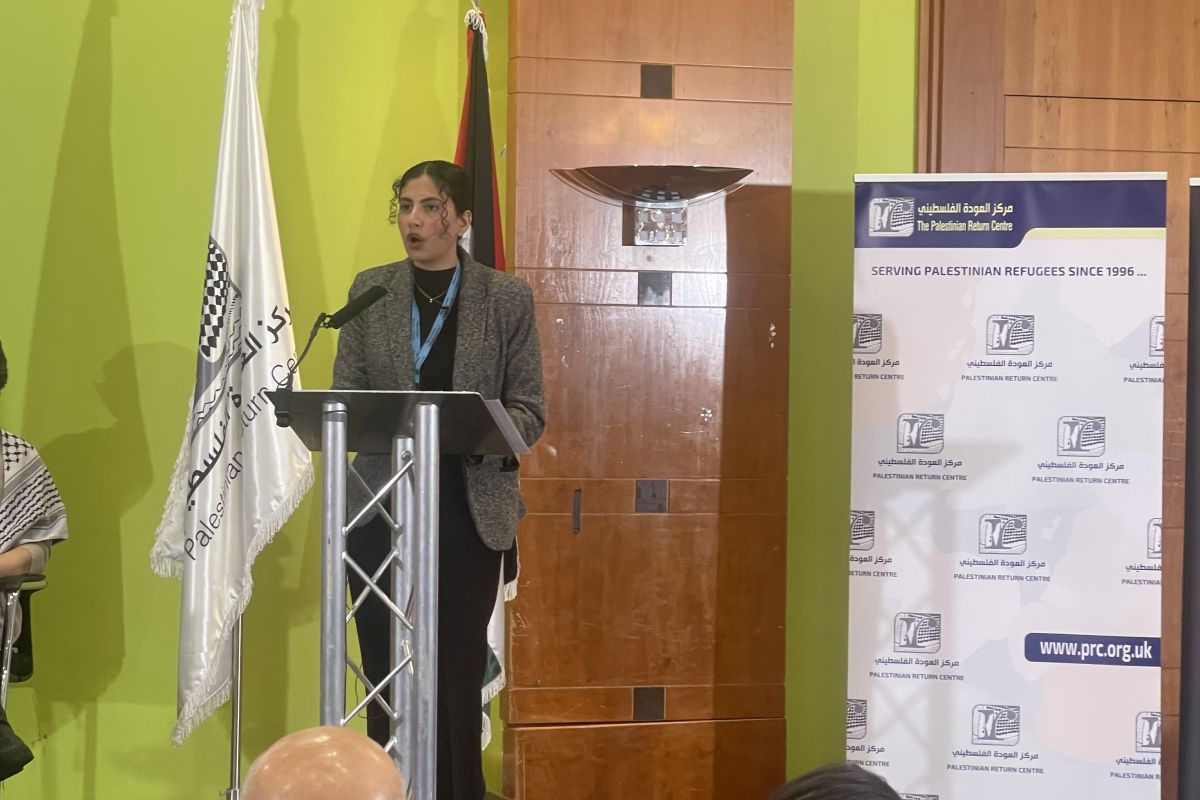
Mira Naseer: Legal Accountability for War Crimes and Corporate Complicity
Mira Naseer addressed the legal mechanisms available to hold Israel accountable for its crimes and the responsibility of states, institutions, and individuals to prevent complicity. She discussed the ongoing genocide case at the International Court of Justice (ICJ), highlighting the court’s provisional measures that place legal obligations on Israel and its allies. She emphasised that these rulings are not just symbolic; they have concrete implications for governments, corporations, and institutions that continue to support Israeli crimes. The rulings put all states on notice that complicity in Israel’s actions carries legal consequences.
She also spoke about the landmark advisory opinion issued by the ICJ in July 2024, which ruled that Israel’s occupation of Palestinian territory is unlawful and must end immediately. The ruling reinforced that Israeli settlements, forced displacement, and apartheid policies violate international law. She stressed that this ruling is a tool for legal and grassroots campaigns to pressure governments into ending their economic and military support for Israel.
Naseer then turned to the role of domestic legal action in countries like the UK, where laws criminalising complicity in war crimes and genocide exist but are rarely enforced. She noted that legal professionals and activists have been working to push law enforcement agencies to investigate individuals and organisations involved in aiding Israeli war crimes. There have also been efforts to challenge the legality of arms exports, as well as corporate complicity in the destruction of Palestinian lives and infrastructure.
She argued that legal accountability is a key pillar of resistance, but it cannot stand alone. Lawfare, as she put it, must be combined with grassroots activism, public pressure, and mass mobilisation. Israel’s ability to act with impunity stems from the political cover provided by its Western allies. The legal framework exists to hold perpetrators accountable, but it requires relentless public and legal pressure to force governments to act.
She closed by emphasising that justice for Palestine will not come from international courts alone. While legal action is an important tool, real accountability will come from sustained global resistance. She called for continued efforts to challenge impunity at every level—whether through the courts, economic pressure, or direct action. The fight against Zionist crimes, she asserted, must remain relentless and uncompromising until Palestinian rights are fully realised.
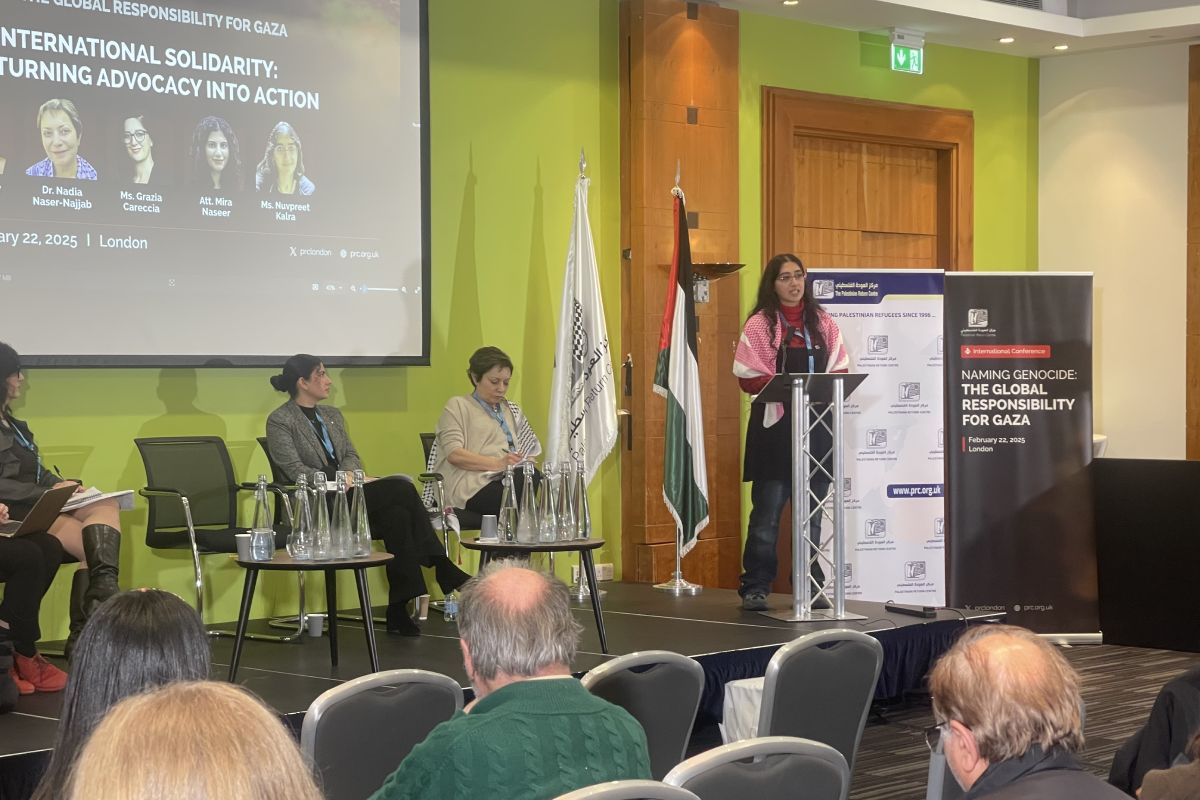
Nuvpreet Kalra: Disrupting Imperialist Normalization
Ms. Nuvpreet Kalra, Digital Content Producer at Code Pink, brought the perspective of grassroots activism, emphasising that solidarity must be a driving force in confronting Zionism and imperialism. She spoke about how Western political elites, particularly in the UK and US, have normalized Israel’s violence while actively suppressing Palestinian voices. She pointed out how politicians selectively express outrage, mourning Israeli losses while remaining silent on the tens of thousands of Palestinians killed. She cited the recent censorship of a documentary about Palestinian children as part of a broader campaign to erase Palestinian voices from public discourse.
Kalra argued that the fight for Palestine is inseparable from the struggle against colonialism and capitalism. She emphasised the need to disrupt business as usual, urging activists to reject normalisation of Zionist institutions in all sectors, from academia to media and commerce. She spoke about the power of direct action, recalling how trade unions and grassroots movements have successfully blocked shipments, shut down arms factories, and disrupted Zionist events. These acts of resistance, she asserted, expose the complicity of Western governments and corporations while reaffirming that collective action can make Palestine ungovernable for those who seek to erase it.
Social media, she noted, has played a pivotal role in breaking through Zionist propaganda. The current genocide in Gaza is the first to be live streamed by its victims, allowing the world to witness, in real-time, the atrocities committed. This, she argued, has fuelled growing support for Palestine among young people, who recognise the colonial nature of Israel’s violence. However, as governments and corporations pour millions into misinformation campaigns, Kalra stressed the need for continued vigilance in exposing and countering Zionist narratives.
She concluded by reflecting on the global nature of the Palestinian struggle, drawing connections between anti-colonial movements worldwide. The liberation of Palestine, she affirmed, is part of the broader fight against racism, imperialism, and capitalist exploitation. Activists in the Global North must recognise their role, not as saviors, but as participants in a movement that demands unwavering, principled, and tangible action in support of Palestinian resistance.
A Unified Call to Action
The final panel left no doubt: the Palestine solidarity movement is an existential threat to Zionism and Western imperialism. From legal warfare to street protests, from economic boycotts to social media activism, the speakers outlined a clear strategy for dismantling Israeli apartheid.
As the panel closed, the message was clear: "We must not lose sight of our unity. Palestine will be free—but only if we fight for it."
22-2-2025
